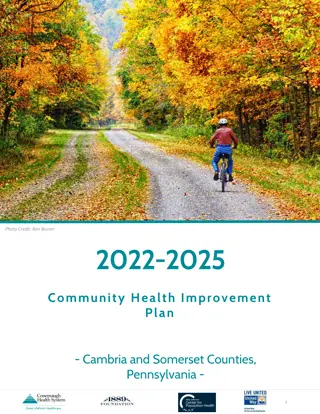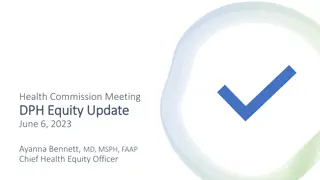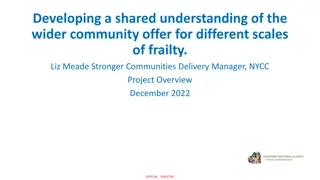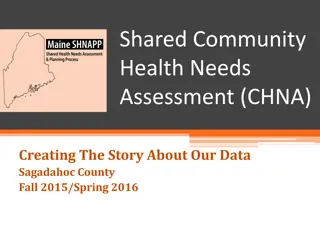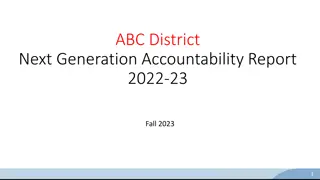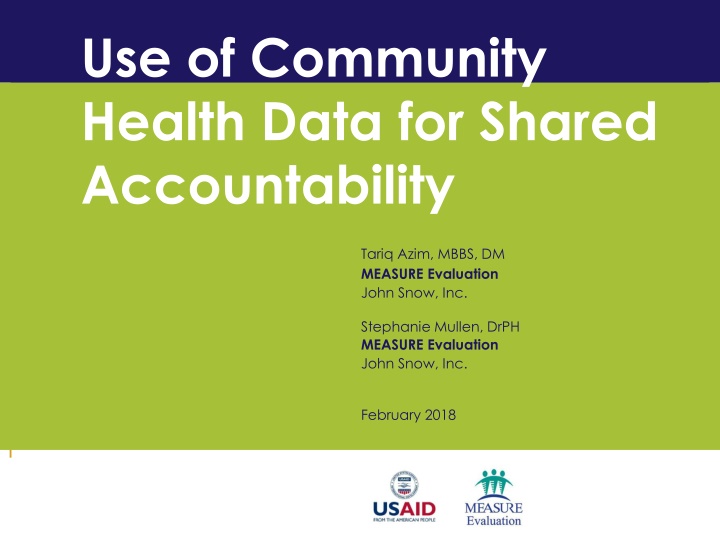
Community Health Data for Shared Accountability
Community health data plays a crucial role in fostering shared accountability between communities and health systems. By involving the community in decision-making and ownership of health initiatives, a more active role is established, leading to improved health outcomes and community engagement. Shared accountability ensures that both parties commit to actions, hold each other responsible, and work towards better health service delivery.
Download Presentation

Please find below an Image/Link to download the presentation.
The content on the website is provided AS IS for your information and personal use only. It may not be sold, licensed, or shared on other websites without obtaining consent from the author. If you encounter any issues during the download, it is possible that the publisher has removed the file from their server.
You are allowed to download the files provided on this website for personal or commercial use, subject to the condition that they are used lawfully. All files are the property of their respective owners.
The content on the website is provided AS IS for your information and personal use only. It may not be sold, licensed, or shared on other websites without obtaining consent from the author.
E N D
Presentation Transcript
Use of Community Health Data for Shared Accountability Tariq Azim, MBBS, DM MEASURE Evaluation John Snow, Inc. Stephanie Mullen, DrPH MEASURE Evaluation John Snow, Inc. February 2018
The Community Is Not in the Spotlight Dissemination and use of data generated by the health system are traditionally limited to the health system. The community is not viewed as: o A decision maker when it comes to the health system o A consumer or user of health data As a result: o The community is disengaged and does not play an active role in improving its own health status. o The health system is not held accountable to the community it serves. o Promotion of community involvement is externally driven. o There is a lack of community leadership and ownership of interventions to improve the community s own health. 2
Community Ownership & Accountability Ownership requires: oTaking responsibility oWith that comes accountability Accountability: oCommitting to decisions and/or actions and holding oneself answerable for those actions and their consequences 3
Shared Accountability to Ensure Health Shared accountability is defined as a process by which partners hold one another responsible for the commitments that they have voluntarily made to each other (Institute of Medicine, 2011). Both the community & the health system (public and/or private) are accountable for: o Sharing health and related information o Taking actions to improve/maintain health o Publicly reporting and answering questions about those decisions and/or actions 4
Shared Accountability for Health at the Community Level Purpose: Create an enabling socio/political environment of mutual trust and transparency between the community and the health system Support the taking of collective responsibility and commitment to shared accountability to improve health service delivery Contribute to the overall health of the community 5
Basic Principles: Community Health Data Use for Shared Accountability The community takes the leadership role in running the forum/meeting Use an existing forum at the community level The community and the health system both share health and related data/information o Health status, service coverage, disease occurrences, service availability, maternal & infant deaths Mutually decide on the health priorities and voluntarily commit to taking responsibility for addressing health priorities Promote transparency and open sharing of data while ensuring privacy and security 6
Qualitative Monitoring of Forum Performance Health System Legend: Green = desired performance Yellow = acceptable performance Red = unfavorable situation Shared Information Took Actions Box 1: Both the health system and the community shared information Box 2: Community provided information; health system acted on it (health system s responsiveness) Shared Information Community Box 3: Health system shared information; community acted on it (community engagement in taking action) Box 4: No information was shared, but both the health system and community acted on their own Took Actions 7
Quantitative Monitoring of Forum Performance 8
Shared Accountability: Cases Disease epidemics: sharing responsibilities and working in tandem o Liberia Ebola crisis There was widespread noncompliance with government- imposed cremation to prevent viral spread. Traditional and religious leaders influenced the development of World Health Organization guidelines on safe burials with dignity, which became government policy at the end of 2014.
Shared Accountability: Cases Community-based maternal death surveillance o Accra, Ghana A modified survey system of community-based reproductive age mortality using six questions was implemented in the Bosomtwa district of Accra o Malawi Community-linked maternal death review: Communities and health facility staff worked in partnership to investigate and respond to maternal deaths occurring in communities and at health facilities
Shared Accountability: Cases Community-based tuberculosis directly observed treatment, short course (TB-DOTS): accountability on both sides o Mozambique Clients choose their DOTS with support from the local volunteers, known as padrinhos Example of community taking responsibility for supervising TB-DOTS Padrinhos make themselves accountable to the larger community regarding adherence to DOTS by the clients of TB services.
This presentation was produced with the support of the United States Agency for International Development (USAID) under the terms of MEASURE Evaluation cooperative agreement AID-OAA-L-14-00004. MEASURE Evaluation is implemented by the Carolina Population Center, University of North Carolina at Chapel Hill in partnership with ICF International; John Snow, Inc.; Management Sciences for Health; Palladium; and Tulane University. Views expressed are not necessarily those of USAID or the United States government. www.measureevaluation.org


